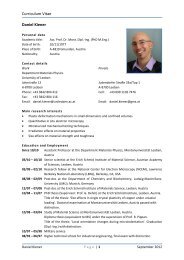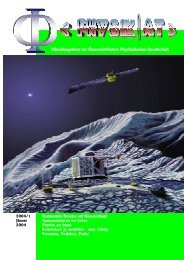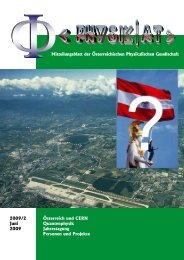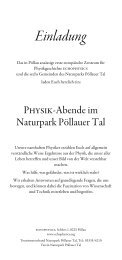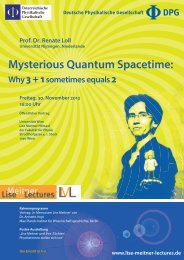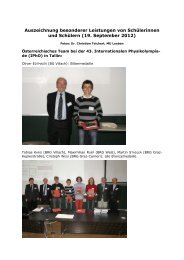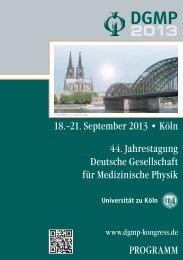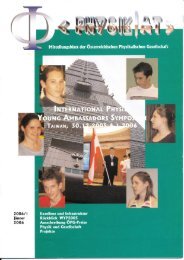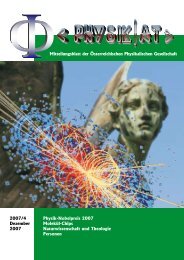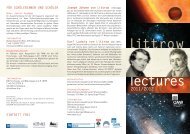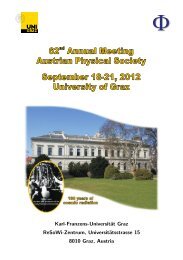Untitled - Austrian Physical Society
Untitled - Austrian Physical Society
Untitled - Austrian Physical Society
Sie wollen auch ein ePaper? Erhöhen Sie die Reichweite Ihrer Titel.
YUMPU macht aus Druck-PDFs automatisch weboptimierte ePaper, die Google liebt.
Science in general and physics in particular is one of the basic elements in our culture that sustain our<br />
communities. lt is also a prerequisite for basic job skills and many of our daily functions. Science and<br />
physics are also the foundation for the high technology revolution seen in our societies and the way<br />
such technologies influence other societal challenges such as environment, energy supply, and communication<br />
and production technologies.<br />
Forum Physics and <strong>Society</strong>, composed of high level physics representatives from 20 European countries<br />
and 7 countries outside Europe, has discussed the role of physics and its interaction with society.<br />
The Forum, being part of the <strong>Austrian</strong> EU-Chair program, was cosponsored by the European <strong>Physical</strong><br />
<strong>Society</strong> and the World Year of Physics 2005 initiative.<br />
The Forum notes the major challenges facing modern science and thus also physics. Globalization is<br />
putting pressure on the ,,physics enterprise". The linear innovation model was abandoned many years<br />
ago and more complex systemic models have been introduced, changing the way knowledge is produced, applied, and<br />
commercialised in social settings.<br />
OECD studies show that a falling share of new tertiary graduates chooses physics as their field of study. Recognizing the<br />
central role of physics in the innovation process, the Forum stresses the importance of strengthening physics as a field of<br />
study and as a scientific profession. The Forum notes that these challenges are of a global nature and express commitment<br />
to address the challenges in Africa. Other regions present similar problems.<br />
The Forum chooses to address five topics of importance for understanding the role of physics in society:<br />
i) culture, ii) competitiveness and technology, iii) funding structures, iv) education, and v) ethical issues.<br />
Tns Rot s oF PHystcs lx SocrETy, Currunr AND THE Screxcrs<br />
Physics represents the rational analysis and accounting of the world we live in. lt forms an essential part of human culture.<br />
Physics allows us to explore the world from the smallest to the largest objects. The application of physics is responsible for<br />
most of the basis of modern society and civilization, and it is essential that a large number of people in all parts of the world<br />
have some understanding of this subject. Electricity and electronics, now part of engineering, had their basis in previous<br />
physics discoveries. There is often a long time interval between basic discoveries and their applications to solving societal<br />
problems. Developments in many areas, including medicine, transport, communications, information technology and even<br />
the arts, have benefited directly from physics discoveries, and we are confident that physics and its methods will be necessary<br />
to solve many problems including those of the environment.<br />
Physics is a good vehicle for international cooperation. Large and complex physics-based facilities are shared successfully<br />
between scientists from many countries. An outstanding example is the CERN Laboratory, formed by European countries<br />
only nine years after they had been fighting each other in World War ll. ln some ways this laboratory was a scientific<br />
forerunner of the EU. lt is worth noting that this laboratory, whose task is to discover the fundamental constituents of the world<br />
and the forces through which they interact, invented the World Wide Web, and gave it freely to the world. Physics education at<br />
all levels needs to be supported, particularly for women, both to ensure that all people understand the technological world in<br />
which we live, and the methods of physics in which observations and experimental results are incorporated into theories of<br />
the world, and also to provide the next generation of scientists and engineers who are greatly in demand in many sectors of<br />
the economy. The importance of physics education appears to be self-evident in a number of Asian countries, whose<br />
economies are boosted by the injection of scientific and technical know-how, and we urge the EU countries with their proud<br />
history of science to face up to this challenge. There is an urgent need for more teachers trajned in physics, and those<br />
teachers who are not fully qualified in this subject need to be supported with appropriate materials and training.<br />
It is encouraging that physics outreach activities and its popularisation as demonstrated in the 2005 World Year have<br />
increased the public's interest in science. ln this respect, the role model of scientists, and particularly of physicists, within the<br />
population has been exemplified in the 2005 World Year of Physics. Many physicists have found their vocation as science<br />
communicators. We encourage a continuing dialogue between scientists and members of the public,<br />
t<br />
which should be of<br />
mutual advantage.<br />
nxrnKxxilx Ixx&xtKiltKxffi il<br />
Nr.2/2O06



